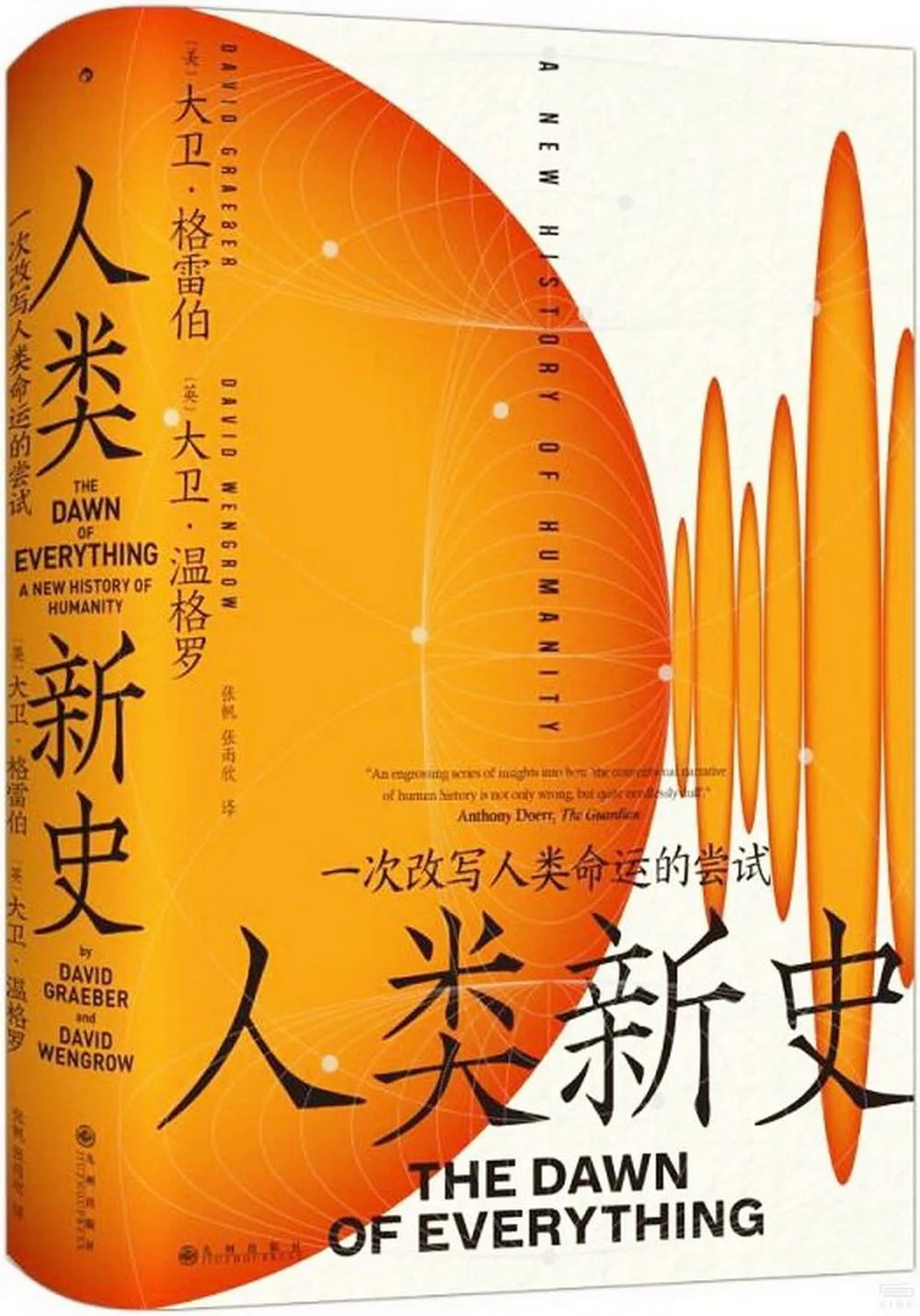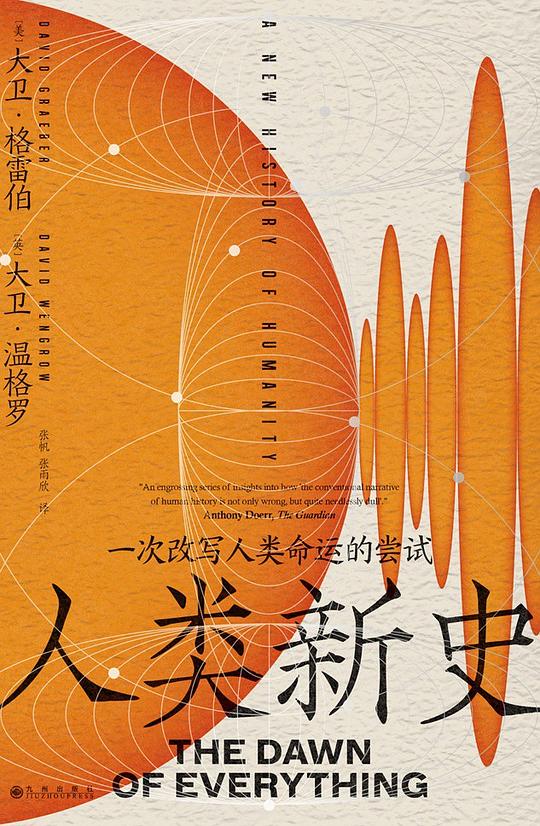1
/
of
2
New History of Humanity
New History of Humanity
[US] David Graeber , [UK] David Ungaro Zhang Fan and Zhang Yuxin 译
Regular price
$39.99 USD
Regular price
Sale price
$39.99 USD
Unit price
/
per
Low stock
Couldn't load pickup availability
About Book
About Book
The Dawn of Everything: A New History of Humanity
🌟 Winner of the 20th Wenjin Book Award in the Social Sciences category 🌟 Shortlisted for the Orwell Prize for Political Writing 🌟 Book of the Year by The Sunday Times, The Observer, and BBC History 🌟 Selected for Kirkus Reviews 2021 Best Books, Amazon 2021 Best Books, and other authoritative book lists → Graeber's most ambitious posthumous work, author of The Debt and The Pointless Work → Challenges the basic assumptions behind Sapiens: A Brief History of Humankind and Guns, Germs, and Steel → Directly addresses the real issues that big history research should focus on: Why has humanity fallen from its former flexibility to its current rigidity, and where does the hope for change lie?🐾When contemplating the fate of human society, we often resort to the wide-angle lens of grand history. But does the familiar, even tacitly accepted, narrative of human development—from egalitarian hunter-gatherer bands to modern nation-states, traversing pivotal moments like the "Agricultural Revolution," the "Urban Revolution," and the "Origins of the State"—really reflect reality? A New History of Humankind reveals that this narrative may simply be a modern-day origin myth.
Tracing the origins of this theory, the two authors discovered that it stemmed from 18th-century Native American critiques of European colonists and the conservative response of Europeans. They then synthesize recent breakthroughs in fields such as archaeology and anthropology to demonstrate the diverse and fluid forms of human social organization and the numerous divergent and parallel paths through which history has traveled. Reinterpreting humanity's past and rediscovering the possibilities inherent in humanity may also provide us with new intellectual resources to imagine a more hopeful future.
🐾
Editor's Recommendation: Translated into over 30 languages worldwide, it has been unanimously recommended by scholars both domestically and internationally. The English edition (late 2021) became a New York Times bestseller upon its release, sparking widespread discussion. It has been highly recommended by renowned linguist and social activist Noam Chomsky, Taleb, author of The Black Swan, and Scott, author of Weapons of the Weak. The simplified Chinese edition has received lengthy recommendations from Chen Jiaying, Wang Mingming, Zhou Xueguang, and Zhang Xiaoyu, as well as unanimous recommendations from Gao Yi, Li Hongtu, Li Junpeng, Liang Yongjia, Liang Jie, Liang Wendao, Shi Zhan, Wang Di, Xu Zhiyuan, and Zhou Lian. (Both recommendations and lengthy essays are included in the accompanying booklet.)
A game-changing take on human history! Challenging traditional classics like "Sapiens: A Brief History of Humankind" and "Guns, Germs, and Steel," this book draws on the latest research in fields such as anthropology and archaeology to forcefully challenge the fundamental premises and many of the viewpoints of familiar grand histories like "Guns, Germs, and Steel" and "Sapiens: A Brief History of Humankind," calling for a fresh approach to human history. The invention of agriculture and the emergence of cities were by no means revolutionary moments; nor do the environment and technology determine the fate of civilizations, as traditionally believed; the development of human society is less a linear progression (with its attendant costs) than a gradual shift from openness to closure. The book introduces concepts such as "seasonality," "split evolution," "the three fundamental human freedoms," and "the three elements of dominance," offering a new framework for interpreting history.
David Graeber, the rebellious scholar who coined the term "bullshit job," is one of the authors of this most ambitious and significant posthumous work. David Graeber, a renowned anthropologist and social activist, was a key founder of the Occupy Wall Street movement and renowned for his critiques of bureaucracy, capitalism, and contemporary politics. He passed away suddenly at the age of 59 (September 2, 2020), having completed this collaborative work, a decade in the making, just three weeks before his death. It represents the pinnacle of his scholarly thought.
Rekindling their energy amidst the current difficulties and confusion, they reimagine human possibility. The two authors comb through materials outside the traditional narrative framework, piece together neglected or misunderstood historical fragments bit by bit: primitive humans likely seasonally jumped between different social orders, rather than clinging to a specific system. Many of the magnificent architectural ruins we think of as symbols of "civilization" were actually just things they built and abandoned seasonally; a surprising number of early cities lacked hierarchical or centralized organizational structures, yet created astonishing cultures; in some traditional societies, property rights did not mean absolute ownership of something, but rather a responsibility to care for it; many important discoveries in history did not come from conceptual breakthroughs, but rather from the accumulation of daily practices, even from play or ritual...
We will see that there is no so-called normal path for the development of history, and that human society has had all sorts of interesting possibilities. Those traditions have never been interrupted, and they have roots that are much older and deeper than the current mainstream order.
🐾
Celebrity recommendation◎ This is a fascinating exploration that leads us to rethink the nature of human ability...both challenging and inspiring.
—Noam Chomsky, renowned linguist, philosopher, and social activist ◎ This New History of Humanity should be the starting point for all subsequent works on such grand themes. Those who embark on this ship (the "Two Davids") will have two unparalleled navigators.
—James C. Scott, Sterling Professor of Political Science and Anthropology, Emeritus, Yale University, author of Weapons of the Weak. This isn't just a book, it's a feast for the senses. Every chapter (and cynically) overturns deeply held beliefs. It's profound, yet deftly unconventional, and well-reasoned, making it a worthwhile read.
—Nassim Nicholas Taleb, author of The Black Swan and Antifragile ◎ ...For over two hundred years, scholars have mistakenly interpreted one part of human nature as the whole. In the author's view, if we must trace human nature historically, we must first recognize that human nature does not exist in a one-sided sense; from the outset, humans possess a richness of humanity.
——Wang Mingming, Professor of Sociology at Peking University ◎ I fully agree with the author. We need to break out of these narrow routines and see more of the contingency of existing lifestyles and social-political systems, so that we are no longer confined to these ways and systems, but understand and explore the various possibilities beyond them.
—Chen Jiaying, Distinguished Professor of Philosophy, Capital Normal University ◎ Human society is entering an era characterized by both profound uncertainty and new possibilities. Reading this book on this subject at this time and place is perfectly timely. The bold assumptions, diverse explorations, and serious academic debates are precisely the first steps toward the return to "freedom" that the author advocates.
——Zhou Xueguan, Professor of Sociology at Stanford University◎ When we are faced with the huge injustice caused by the existing political and economic structure, when we are forced to acknowledge the reality we do not want to admit due to the powerful pressure from those above us, as long as we know that history always allows the existence of possibilities, then even if the Enlightenment has passed, we can still draw great courage from it.
—Zhang Xiaoyu, winner of the Asia Book Award and author of the "Civilization Trilogy." Drawing on decades of recent research in anthropology and archaeology, this book undoubtedly presents an unprecedented and serious challenge to the prevailing theories of social evolution since the Enlightenment. While there are still many points that warrant discussion, the authors' extraordinary courage and passion for truth-seeking, their profound professionalism, and their earnest social concern make this a compelling and deeply instructive read. In particular, through the book's revelation of the universal state of "harmonious coexistence" before the advent of agricultural society, we may even be able to grasp the long-obscured true meaning of the Enlightenment concept of "civilization."
—Gao Yi, Professor of History, Peking University ◎ The author's main theme and goal in writing this book is to explore how to view humanity's past with new eyes. By examining fundamental questions about the evolution of human history, the author strives to break through existing preconceptions and offer new interpretations in his pursuit of origins. Reading this book will broaden our horizons and inspire us to reflect deeply on how to reshape our world and explore possible paths for future social change.
—Li Hongtu, Professor of History, Fudan University ◎ This book's originality and scholarly ambition are impressive. Graeber and Ungerow challenge not only Hobbes and Rousseau but also the standard historical narrative of modern civilization. The sophistication and rigor of their arguments command respect. This book not only gives a voice to those "without history," but also inspires us to think deeply about the concepts of good and evil, and what it means to be human.
—Li Junpeng, Professor of the School of Social Sciences at Central China Normal University and Editor-in-Chief of International Sociology Reviews "A New History of Mankind" destroys the myth of primitive man, the foundation of many academic disciplines. Contemporary anthropological and archaeological research demonstrates that humanity at the dawn of time possessed astonishing complexity, flexibility, freedom, and critical thinking. The primitive man imagined by Enlightenment thinkers for contemporary social science is both historically and logically impossible. "A New History of Mankind" may mark a new starting point for social science.
—Liang Yongjia, Qiushi Distinguished Professor, Zhejiang University. David Graeber's writings always offer the unexpected, stirring up the academic world. Returning to his roots, he unsurprisingly tells a fresh story about human origins. Every reading of Graeber is a profound intellectual challenge.
— Liang Jie, Associate Professor, Shanghai University of Finance and Economics ◎ This is a work of considerable courage. The two authors, guided by a humanistic spirit, challenge some of the fundamental frames of reference in traditional grand historical narratives. The new understanding of human nature and civilization it calls for is worthy of our deep reflection.
—Shi Zhan, a scholar at the Institute of Global Civilization History, Shanghai International Studies University. This book is the result of the intellectual fusion of anthropologist David Graeber and archaeologist David Ungerow. Drawing on groundbreaking research in archaeology and anthropology, they lead us to reexamine human civilization and world history, fundamentally shifting our understanding of its origins. Rejecting the grand narratives that have dominated in the past, they employ clear, powerful, engaging, and rich archaeological and ethnographic detail to offer a series of fresh and captivating insights, exposing profound misunderstandings in our past understanding of human history. Through elegant and accessible prose, the story of humanity's diverse existence and evolution unfolds before the reader.
When we contemplate the fate of human society, we often employ the wide-angle lens of big history. But does the familiar, even tacitly accepted, narrative of human development—from egalitarian hunter-gatherer bands to modern nation-states, traversing pivotal moments like the "Agricultural Revolution," the "Urban Revolution," and the "Origins of the State"—really reflect reality? A New History of Humankind reveals that this narrative may simply be a modern version of an origin myth.
Tracing the origins of this theory, the two authors discovered that it stemmed from 18th-century Native American critiques of European colonists and the conservative response of Europeans. They then synthesize recent breakthroughs in fields such as archaeology and anthropology to demonstrate the diverse and fluid forms of human social organization and the numerous divergent and parallel paths through which history has traveled. Reinterpreting humanity's past and rediscovering the possibilities inherent in humanity may also provide us with new intellectual resources to imagine a more hopeful future.
Publication Date
Publication Date
2024-09-01
Publisher
Publisher
九州出版社
Imprint
Imprint
the new wave
Pages
Pages
560
ISBN
ISBN
9787522527949
share



